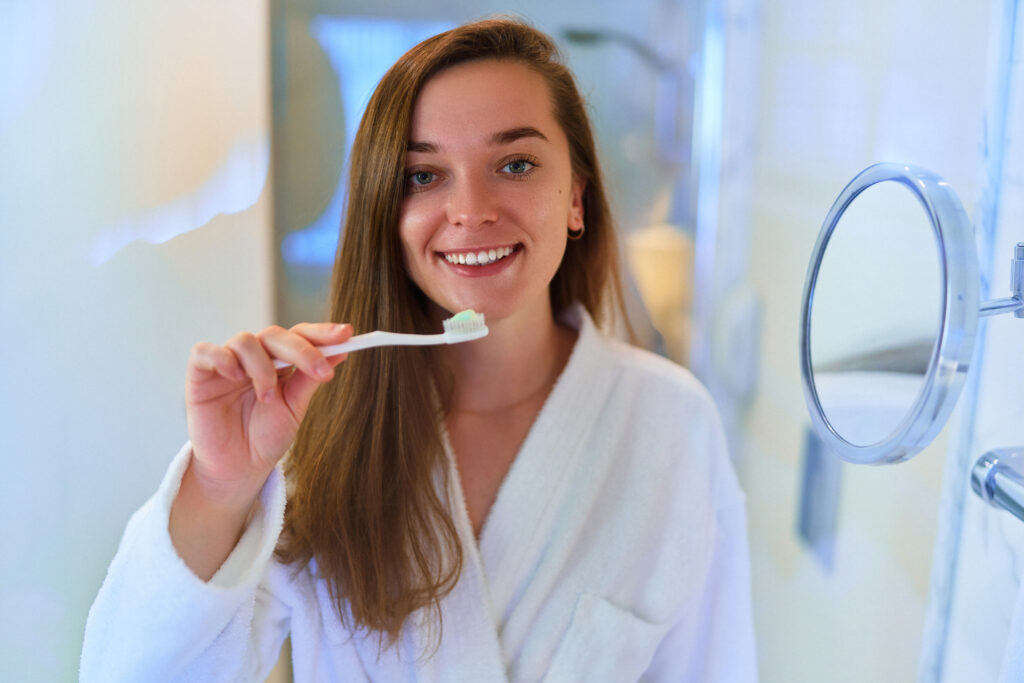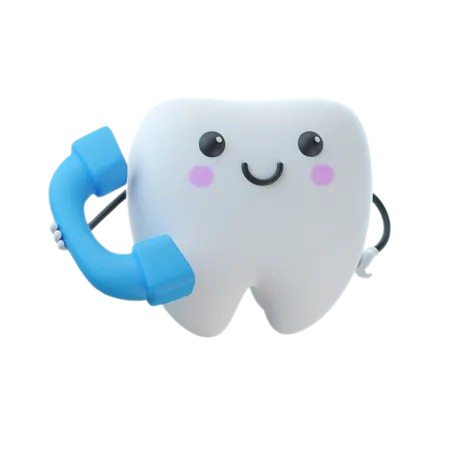A bright and healthy smile is the first thing people will notice about you! While it is easy to schedule regular visits to your dentist and keep your dental procedures and check-ups in place, what happens at home on a daily basis is equally, if not more, important to your oral health. Dental care is a lifelong regimen to keep your teeth strong, gums healthy, and smile as bright as possible.
People tend to think after they get their teeth professionally cleaned regularly, their care will prevent dental problems. This is false. You have to lay your foundation for oral health daily and that is what will prevent problems in the future. Your dentist is your personal guide and will be a partner, while your daily habits are tools to keep you on track.
Below are simple, but very effective, ways to keep your smile where it needs to be between dental visits.
1. Brush Twice a Day – The Right Way
Brushing twice a day is important to oral care, but how you brush is equally important. Angle the bristles to a 45° angle towards the gum line. There is usually the most plaque building up here. Clean with a soft toothbrush and a fluoridated toothpaste for at least two minutes. Don’t forget to brush your tongue, where there can be bacteria that causes bad breath!
Fun Fact! You should replace your toothbrush every 3-4 months, or even sooner if the bristles are fraying! If your toothbrush is worn down it won’t clean your mouth effectively. An electric toothbrush is an additional good investment for extra cleaning.
2. Floss or Use Interdental Brushes Every Day
Flossing is not done by a lot of people. Brushing only cleans about 60% of your tooth surface. The rest of your tooth surface, which is generally the other 40% is between your teeth. Food and plaque can hide in those areas. Flossing or using interdental brushes will help get the food and plaque out which reduces your chances of gum disease, cavities, and bad breath.
If you find it difficult or confusing to floss, then try floss picks or water flossers. These are more convenient. Just try to make the habit of daily flossing or using an interdental brush a consistent habit, not an occasional one.
3. Mind Your Diet – Your Teeth Eat What You Eat
Some of your eating habits directly affect your oral health. All sugary foods and carbonated drinks create the perfect environment for bacteria that cause cavities. Acidic foods and drinks, like sodas and citrus, can down enamel over time.
Try to limit:
- Sweets, candies, and desserts
- Fizzy and energy drinks
- Coffee, tea, and red wine (which stain teeth)
Instead of above, choose smile-friendly foods like cheese, nuts, crunchy vegetables, and apples. These not only support overall health but also help clean your teeth naturally while you chew.
Tip: If you can’t avoid your favorite coffee or wine, drink water afterward to rinse away staining agents.
4. Stay Hydrated – Water is Your Best Friend
Water is essential for overall health and your smile. It washes away food particles, reduces dry mouth, and helps neutralize harmful acids. In many places, tap water also contains fluoride, a natural mineral that strengthens enamel and prevents cavities.Keep a water bottle handy , take a small sip the entire day, after meals.
5. Steer Clear of Unhealthy Habits
Some lifestyle habits can damage your teeth more than you realize:
Tobacco use: Increases the risk of gum disease, bad breath, and staining.
Using teeth as tools: Opening bottles or biting hard objects can crack or chip enamel.
Teeth grinding (bruxism): It is common at night, it can wear down teeth. A custom night guard from your dentist can help protect against this.
Breaking these habits not only improves your dental health but also benefits your overall well-being.
6. Use Mouthwash with Purpose
Mouthwash cannot replace brushing and flossing but can complement your overall routine. The fluoride rinse will also help to strengthen your tooth enamel and offer some protection against decay. Remember you should not rinse with mouthwash right after brushing your teeth (this can wash away the benefits of the toothpaste)
It is important to benefit from rinsing at a different time of day, after lunch or before bed could work.
7. Know When It’s Time to See Your Dentist
Even with the best home care, some problems require professional attention. Don’t ignore warning signs like:
Persistent toothache or sensitivity
- Bleeding gums when brushing or flossing
- Swelling or sores that don’t heal
- Loose, chipped, or broken teeth
Treatment is always easier, more comfortable, and cheaper than some form of treatment when a problem is advanced. Regular examinations ensure that your dentist will find a problem before it becomes a problem.
Conclusion
Taking care of your smile doesn’t have to be difficult, this is the simple process If you brush and floss every day, eat sensibly, drink a lot of water, or avoid bad habits. If you add regular checkups, you’re sure to have a terrific smile and self-image for years to come.
At KAA Dental, we promise to be there any hour of the way.. Whether it’s on a general exam, preventive advice, or treatment, our mission is that you would achieve and maintain excellent oral health. Remember: your smile is an investment, if you take care of it every day, it will pay off with confidence and years of excellent results.
FAQ's
Brush twice a day with fluoride toothpaste, floss or use interdental brushes daily, drink plenty of water, eat a balanced diet, and avoid harmful habits like smoking or teeth grinding.
Yes. Brushing cleans only the visible surfaces of your teeth. Flossing removes plaque and food between teeth where brushing cannot reach, helping prevent gum disease and cavities.
Foods like cheese, nuts, leafy greens, crunchy vegetables, and apples support strong teeth and gums. Drinking water after meals also helps wash away harmful acids.


